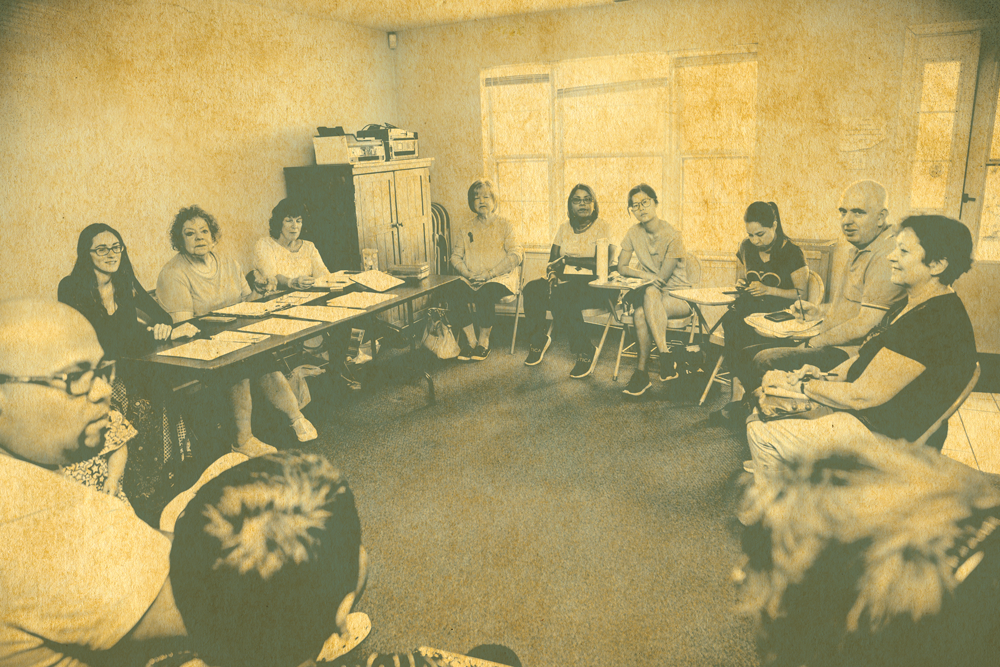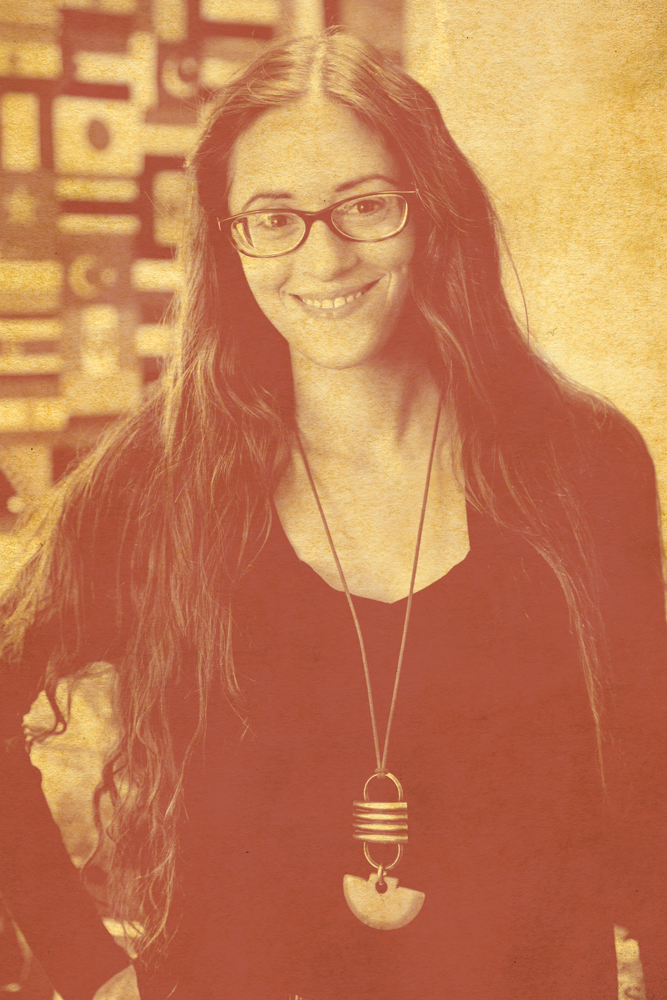A Smaller World
With the help of Arcadia students, alumni, and faculty, Meg Eubank ’05, ’07MEd is building and empowering an international community in Greater Philadelphia.
Nǐ hǎo. Privyet. Hola.
 On a quiet, residential street in Langhorne, Pa., greetings are exchanged in a blend of languages. But when Meg Eubank ’05, ’07MEd and English as a Second Language (ESL) instructor Debbie Hoffman take their seats at the head of the semicircle, the group, in unison, calls out: “Good morning.”
On a quiet, residential street in Langhorne, Pa., greetings are exchanged in a blend of languages. But when Meg Eubank ’05, ’07MEd and English as a Second Language (ESL) instructor Debbie Hoffman take their seats at the head of the semicircle, the group, in unison, calls out: “Good morning.”
Today, the topic is birthdays. Favorite memories range from bar mitzvahs, to quinceañeras, to spontaneous Australian getaways (an aside that prompts Eubank to grab her globe for a quick geography lesson). A newcomer from the Dominican Republic reminisces about dancing the bachata, while Mandy—who moved to the United States from China four years ago—laughs, adding “my friends aren’t good at dancing, but we like our beer!”
This is Welcoming the Stranger (WTS), one of five nonprofits to receive a 2019 Renewal Award, the flagship of Allstate and The Atlantic’s collaborative efforts to celebrate social innovation. The recognition, which includes a two-year, $40,000 grant, spotlights grassroots solutions to challenges faced by communities across the U.S. WTS was selected from more than 9,300 nominations and beat out 333 entrants from Pennsylvania alone.
Classes change week to week, serving immigrants and refugees throughout the Delaware Valley. The constant, though, is the supportive community WTS students have formed—a second home, no matter how far home may be.
Learning Brought to Life
When it comes to shared values, Arcadia and WTS are an obvious match (see “Arcadia Welcomes Refugees”).
Since its inception 20 years ago, the organization has served more than 4,000 participants from 104 countries. In addition to English, technology, and citizen preparation courses, WTS offers an outlet for adult learners to celebrate their cultures while acclimating to their new environment. The primary goal is to renew their confidence through language acquisition, ensuring each WTS student participates fully in American life: from simple acts like ordering at restaurants, to major undertakings like applying for jobs, communicating with doctors and landlords, and navigating the immigration court system.
“We are working with adults with a lifetime of experience behind them,” said Eubank. “They come from rich backgrounds, with autonomy and dignity in their home countries—then they move here without a support system. They’re trapped inside themselves.”
Eubank, who earned a Bachelor of Arts in Elementary Education in 2005, taught in private schools before returning to Arcadia for a Master of Education in Language Arts. After graduating in 2007, Eubank taught ESL at Bucks County Community College, where a colleague told her about WTS. She volunteered to teach in 2011, came back to Arcadia for her ESL Program Specialist certification in 2014, and stepped in as executive director in 2015.
Since, Eubank—the organization’s only full-time staff member—has recruited Arcadia interns to compile resources, organize events, and pursue projects that align with their personal and professional interests. Amara O’Connell ’19, for instance, spearheaded a mentor program that connects English-speaking volunteers with WTS students throughout the summer.
“Many don’t have people they can simply go to the movies with,” said O’Connell, an International Studies and French graduate from Buffalo, N.Y. “We had [WTS members] doing things like bowling and mini-golfing for the first time.”
O’Connell also helped produce an international cookbook after a unit on recipe writing. Hope Louizes ’19, an International Studies alumna from Huntingtown, Md., designed the cookbook and several promotional pieces, while Emma Sinclair ’21MEd—who chose to pursue her master’s at Arcadia after volunteering with Eubank—expanded the organization’s social media presence.
Eubank believes Arcadia students are uniquely prepared for internships at WTS, lauding the School of Education’s commitment to teaching educators how to work and adapt in a global world. At Arcadia, she was encouraged to jump into a range of academic settings, work with diverse student populations, and explore cross-cultural education through study abroad.
“Each student who works with Meg applies the principles they learn in our classes,” said Eubank’s mentor Dr. Peggy Hickman, associate professor of Education at Arcadia. “They also witness the profound respect and passion Meg and her colleagues show in their commitment to their students.”
That passion is contagious. Since completing their internships, O’Connell decided to pursue a career in immigration law; Louizes set out to work with international students; and Sinclair realized her interests lie in ESL instruction, with an emphasis on developing language resources for youth in local school districts.
“Adapting to a new culture, health care system, driving laws, and so many things that we take for granted every day is an immense undertaking,” said Louizes. “It wasn’t until I began working with WTS that I experienced the obstacles immigrants face. Everything I learned at Arcadia came to life.”
Breaking Barriers

When Eubank started as an instructor, WTS served 150 students total. Funding cuts forced similar organizations in the region to close their doors, sending hundreds to WTS classrooms. By 2017, their classes increased to more than 300 students per semester—but their budget also shrank, preventing the organization from replacing outdated technology and recruiting necessary manpower.
Moreover, heightened polarization over immigration instilled fear within the WTS community. In response, the organization conducted a listening campaign to learn what worried students most. The predominant answer, discrimination, prompted “know-your-rights” workshops to teach students nonviolent safety techniques. WTS also connected with immigrant rights groups and pro bono lawyers to augment its services and offered ally training to its growing roster of volunteers.
One positive has been the outpouring of support from innovative educators who believe in WTS’ mission. The Renewal Award will support such growth, generating a pool of operating funds that Eubank assures they’ll “make the most of.”
But Eubank hopes the grant will help extend their message to those who don’t witness, on a daily basis, the power personal connection has in dismantling cultural silos.
“My world has become smaller, in a good way,” said Eubank. “Underneath, we’re people who care about the same things: family, education, and making the most out of life.”
New Beginnings
The birthday lesson winds into a reflection on what it means to be happy. The topic brings forth emotions that are difficult to express, but WTS students are reminded that they are safe to make mistakes here. They repeat a simple affirmation—“I am learning English”—when they stumble on a word.
“I’m learning a lot today. Improving my ear to listen,” says Gracie, a student from the Dominican Republic. It’s her first class at WTS. After five years of living in Philadelphia, she’s ready to develop her conversational English.
Her summary of Day One? “No stress.”


